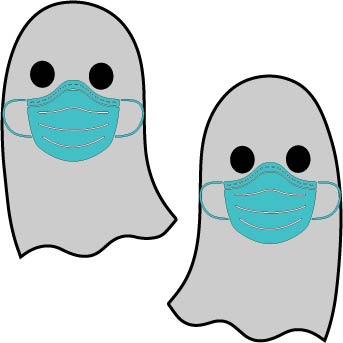Halloween Health Guidelines

Elizabeth Kaiser graphic
The number of Americans planning to celebrate Halloween this year has dropped by 10% because of COVID-19, according to statista.com.
Under normal circumstances, Halloween is celebrated through trick-or-treating, costume parties and haunted houses.
This year, plans have changed for many people. Trick-or-treating will look very different, parties are discouraged and haunted houses are closed.
Meanwhile, health officials are trying to create guidelines to follow, but many members of the community have not received them.
Trick-or-treating, the most popular Halloween tradition, has drastically changed this year.
In an interview Alec Eshelman, a professor of psychology here at UW-Platteville and a father of two, talked about his family’s alternative to trick-or-treating this year.
“It’s called trunk-or-treat… there’s a line of cars and they have candy in the trunk of the car, and the kids walk from car to car getting candy the same way as trick-or-treating,” Eshelman said.
This is a creative solution and fits well within guidelines received in an email from the Wisconsin Department of Health, which simply stated: “Going house-to-house and having in-person contact is not recommended.”
Eshelman also states that he would be comfortable with normal trick-or-treating if everyone followed the recommended guidelines, but does not trust everyone to do so.
Costume parties are also heavily discouraged, but the community is unlikely to listen. The Wisconsin Department of Health’s recommendations for parties is: “In-person costume contests and parties are not recommended, no matter where they might be held.”
However, they suggested the alternative option of holding “virtual costume contests and parties. Dress up. Get online with friends and other families to celebrate and rate each other’s costumes.”
While health officials may be recommending safety, this recommendation seems to be tossed to the wind by many.
It also appears that, though the recommendations from the Wisconsin Department of Health can be effective, many people simply do not know they exist.
When asked if he thought health officials were doing a good job relaying that information to the public, both Eshelman and the UW-Platteville student said they could be doing a much better job.
While Eshelman had to do his own research to find the recommended guidelines, the student said they only knew what they were because their parents relayed the information.
This year, Halloween will be very different. From trick-or-treating to parties, many normal traditions and celebrations are not an option this year. While many people are staying safe, many others are not listening to the guidelines at all.



